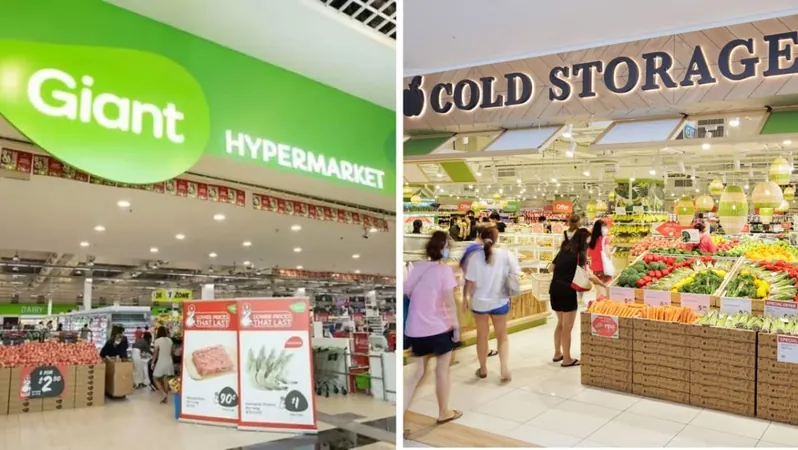
Major Shake-Up in Singapore's Supermarket Sector: Cold Storage and Giant Sold Amidst Rising Challenges
2025-03-25
Author: Wei Ling
SINGAPORE: In a stunning move that highlights the ongoing transformation of Singapore’s retail landscape, the DFI Retail Group has sold its Cold Storage and Giant supermarket chains to Malaysian retail powerhouse Macrovalue for S$125 million (US$93 million). This decision, made public on March 24, not only marks DFI's exit from traditional grocery retail in Singapore but also reveals the pressures supermarkets face in a rapidly evolving market.
DFI’s decision to offload 48 Cold Storage and 41 Giant stores, including two distribution centers, signals a strategic shift aimed at redirecting focus toward its more profitable health and convenience sectors, such as Guardian and 7-Eleven. Notably, DFI's health and beauty division comprised over 50% of its operating profit last year, underscoring the company's pivot toward higher-margin businesses.
The Decline of Giant
The fate of the Giant brand has been particularly concerning, with eleven of its outlets shuttered in 2024. Analysts recognize that although the supermarket industry in Singapore is robust, growth potential remains modest amidst fierce competition from both traditional retailers and online grocery platforms like RedMart.
Expert Insight: Thinning Profit Margins
Dr. Terence Fan, an assistant professor at Singapore Management University, pointed out that the supermarket industry has always operated on slim margins. DFI has grappled with challenges over the past decade, including the emergence of online competitors and impacts from the COVID-19 pandemic. Under these pressures, it comes as no surprise that DFI has chosen to exit the sector, where profit margins have become increasingly contentious compared to other business avenues like health and beauty.
Competitive Advantages for Macrovalue
Macrovalue's acquisition decision appears strategically sound, given the proximity between Malaysia and Singapore and the scalability benefits it brings. Macrovalue is no stranger to the Cold Storage and Giant brands, having previously acquired GCH Retail Group in Malaysia. Their established operational mechanisms could allow for more competitive pricing strategies in Singapore, which is likely to shake up the local market.
A Resilient Retail Landscape
Despite the challenges faced by these supermarket chains, the broader market remains resilient. Data released by Singapore's Department of Statistics revealed an 11% year-on-year increase in retail sales for supermarkets and hypermarkets as of January. Cold Storage and Giant reportedly posted positive operating profits in the past fiscal year, which hints that the supermarket sector is far from defunct.
Industry insiders note that the competitive landscape, dominated by players like NTUC FairPrice and Sheng Siong, will be challenged further, with emerging niche markets like Don Don Donki coming into play. The future will necessitate agility among established brands to adapt to evolving consumer preferences.
Impact on Customers and Future Prospects
As customers wonder about the future of exclusive product lines and longstanding loyalty programs, the fate of DFI's Yuu rewards scheme remains uncertain. A DFI spokesperson confirmed that regular credit card rewards and existing cash vouchers will remain valid through the transition, including for return customers at Cold Storage and Giant outlets.
Concerns about pricing strategies also loom large. Some analysts speculate that Macrovalue might initiate aggressive pricing to gain market share, while others suggest that it may employ subtler promotional tactics like bundling and loyalty programs to retain customers.
Is It a Good Deal?
The sale price of S$125 million has sparked debates online, especially when contrasted against other recent acquisitions in the region, such as Eu Yan Sang's S$695 million sale to a Japanese consortium. Analysts caution, however, that the difference in valuations stems from Cold Storage and Giant's weaker performance relative to more lucrative entities like Eu Yan Sang.
While some experts, including Prof. Lawrence Loh from the National University of Singapore, believe the sale price reflects a fair market assessment—evidenced by DFI's share price bump post-announcement—others think it could lean toward being underestimated.
As Singapore continues to navigate through a landscape rife with both challenges and opportunities, the full implications of this notable acquisition remain to be seen. Will Macrovalue's entry bring about a renaissance for the supermarket sector, or will it further disrupt a market already in flux? One thing is for certain: change is on the horizon for grocery shopping in Singapore.






 Brasil (PT)
Brasil (PT)
 Canada (EN)
Canada (EN)
 Chile (ES)
Chile (ES)
 Česko (CS)
Česko (CS)
 대한민국 (KO)
대한민국 (KO)
 España (ES)
España (ES)
 France (FR)
France (FR)
 Hong Kong (EN)
Hong Kong (EN)
 Italia (IT)
Italia (IT)
 日本 (JA)
日本 (JA)
 Magyarország (HU)
Magyarország (HU)
 Norge (NO)
Norge (NO)
 Polska (PL)
Polska (PL)
 Schweiz (DE)
Schweiz (DE)
 Singapore (EN)
Singapore (EN)
 Sverige (SV)
Sverige (SV)
 Suomi (FI)
Suomi (FI)
 Türkiye (TR)
Türkiye (TR)
 الإمارات العربية المتحدة (AR)
الإمارات العربية المتحدة (AR)